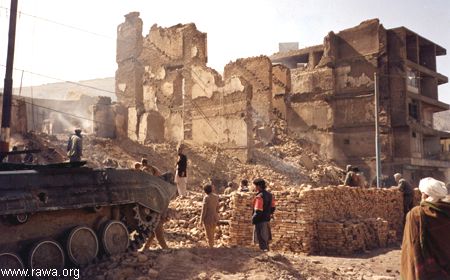By Nushin Arbabzadah, AsiaMedia Contributing Writer

RAWA: Kabul was destroyed by the Jehadi fundamentalist bands (the Northern Alliance and Gulbuddin terrorist party) . According to UN 90% of Kabul city was destroyed in 1992-96.
Afghanistan's mujahedeen gloss over their misdeeds of the '90s and lawmakers go along
The scene: Kabul in the early 1990s.
A crowd of people wait, cowering on the side of a road. They need to cross this road to get to their homes in the west of Kabul but they don't dare. Bullets are flying from all directions over their heads. So they keep their heads down, wait. Then there is a brief moment of ceasefire, a chance to cross the road unscathed and reach home. The first to dare is a man on a bicycle. He rides off, keeping his head low. Two children follow his example and start walking, first slowly, then quickly. Next is a woman. She grabs a girl's hand, leaves the crowd and starts running. The girl struggles to keep up with the woman. Moments later, a rocket is fired. It hits the cyclist and the two children who had followed his example and set off on the road. The three of them are instantly killed.
"They've been firing rockets non-stop over the last three days and nights. The situation is very dangerous but we can't leave. We are stuck," an elderly man says to a camera. He is standing in the middle of a dusty path surrounded by homes made of mud-brick. He is a local and confirms to the camera that this is a residential area, a place where civilians live. The camera then moves to a group of young men standing at the door of a low-rise mud-brick house. They name the location from which the rockets are fired: Karte-Seh, a residential area.
The camera turns away from the men and focuses on the road again. The road is wide, empty and unlike most roads in Kabul at the time, it is paved. A rocket is shot amid flying bullets. The camera follows the rocket. It flies in a straight line in the middle of the road and seconds later, it hits one of the mud houses situated on the Asmai Mountain of Kabul. This is where the poor live, those who cannot afford to live in the valley. The house catches fire, smoke rising to the sky.
More than a decade later, on July 15, 2007, a private Afghan television channel showed this footage as part of a program about war crimes and war criminals in Afghanistan. Here was evidence -- clear, undeniable and for all to see -- that civilians were killed in the struggle for power between groups of mujahedeen in the early 1990s. To be precise, 65,000 civilians were killed in Kabul alone at the hands of the same people who had ensured Afghanistan's freedom and independence from the Soviet Union.
Once freedom was gained and independence ensured, they turned against each other and another war started. This was in the years between 1992 and 1996, a period known as the time when the mujahedeen ruled Afghanistan. Today, the same people who ordered the rockets to be fired across Kabul, treating the Afghan capital as their own private battlefield, would rather forget about this less-than-flattering chapter of their history as the mujahedeen -- the holy freedom fighters who inspired generations of young men across the globe to join the Afghan struggle for independence in the 1980s. They would rather forget this period of "mistakes" and be solely remembered for their heroic deeds against the Soviet army. In their own eyes, they are national heroes, Afghanistan's equivalents to India's Gandhi or Pakistan's Jinnah.
When Malalai Joya, a member of parliament from Farah province, pointed out in a parliamentary session that a distinction should be made between honorable freedom fighters and criminal ones -- those who had looted, raped and killed civilians -- there was uproar as the male members of parliament, angry, stood up and left their seats in protest. A group of female members of parliament felt compelled to protect Joya; they gathered around her in a circle while listening to the men shout threats to Joya. The men made it clear that they would not tolerate insult to their jihad and threatened Joya with rape and murder: some habits are clearly hard to kick.
In a speech delivered on Dec. 8, 2007, Afghan President Hamid Karzai for the first time openly admitted that the same warlords who had abused the people's rights in the past were now part of his government and continued to violate human rights. He said, "We had no option but to include them in the government. They had the tanks, the guns and the dollars while we had nothing. We had to include them in the government; otherwise they would have carried on killing."
These are the words of the same Karzai who in 2002, when he was chairman of the Afghan interim administration, promised that justice would be delivered to the Afghan people. But far from being held accountable, warlords and war criminals were given immunity from prosecution after parliament passed a bill in March 2007, granting amnesty to all parties involved in the wars of the last 25 years. They include the communists, the mujahedeen and the Taliban, each of whom are responsible for serious crimes against the Afghan people, their dignity, history and international standing.
The nation has not forgiven them but it is clear that the war criminals have not only forgiven themselves but also forgiven each other.



